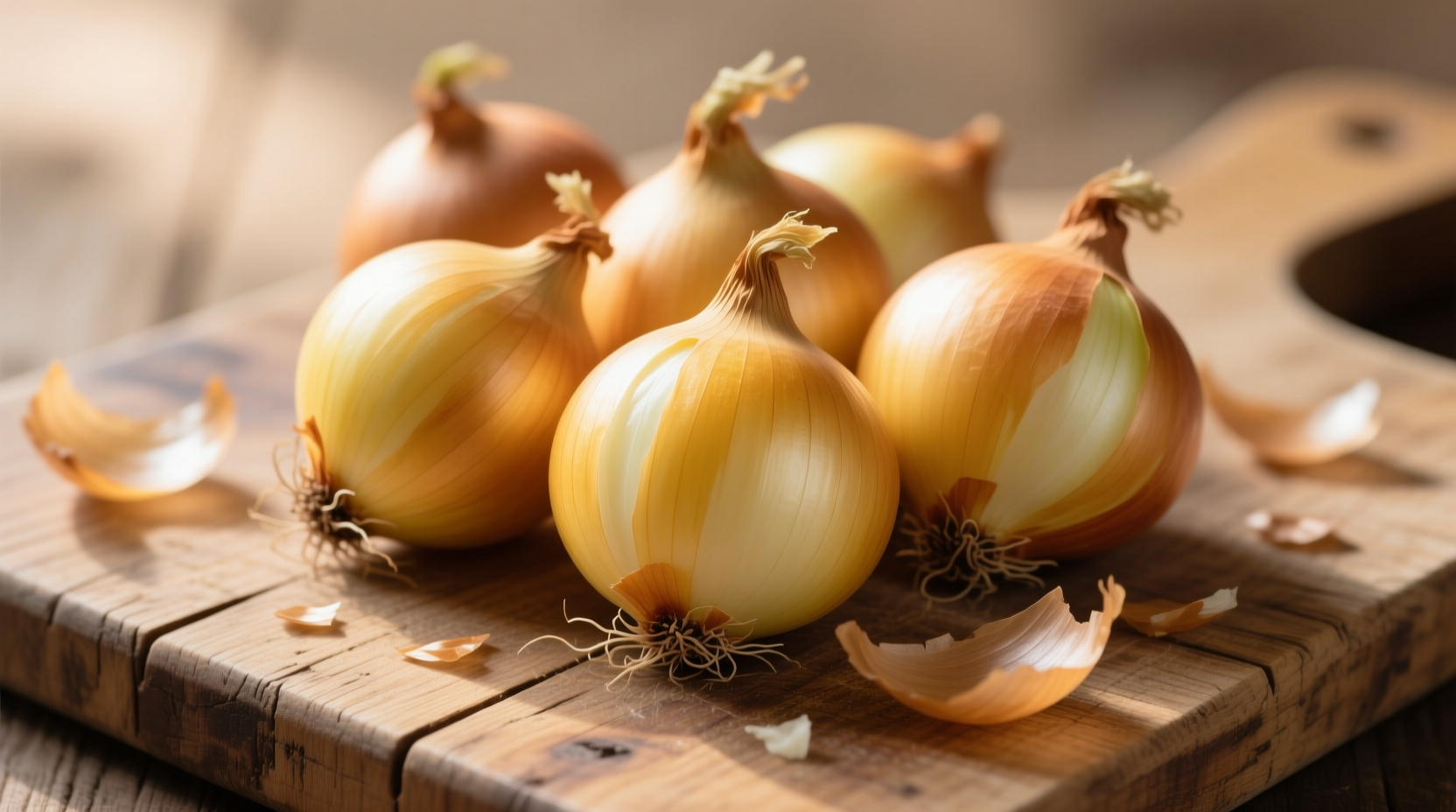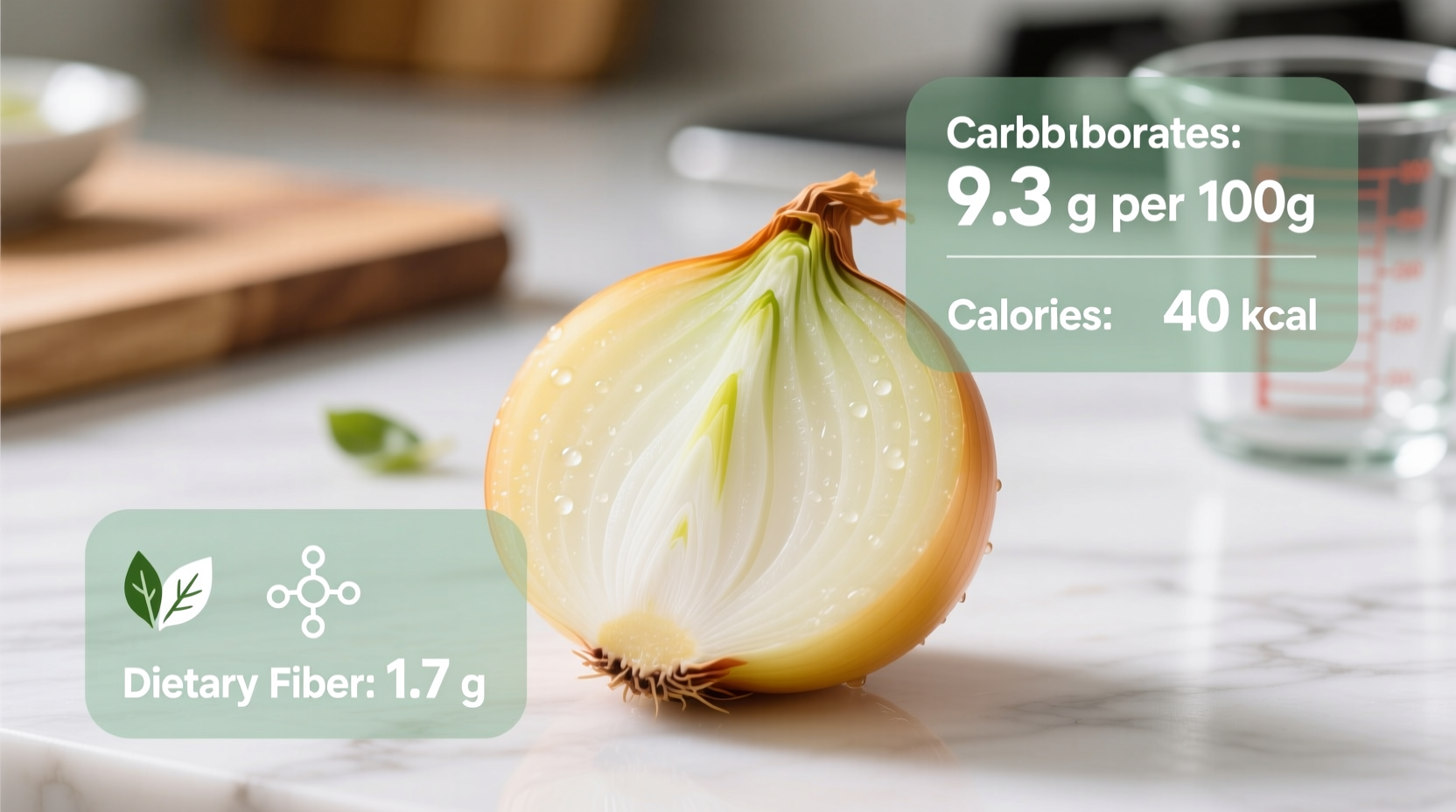Understanding Onion Carbohydrates: What You Need to Know
When tracking your daily carbohydrate intake, knowing the precise nutritional content of common ingredients like onions is essential. Whether you're managing diabetes, following a low-carb diet, or simply monitoring your nutrition, understanding the carbohydrate composition of onions helps you make informed dietary choices.
Carbohydrate Breakdown by Onion Type
Not all onions are nutritionally identical. The carbohydrate content varies slightly depending on the variety. Here's how different onions compare based on USDA FoodData Central measurements:
| Onion Type | Carbohydrates (per 100g) | Dietary Fiber | Natural Sugars |
|---|---|---|---|
| Yellow Onion (raw) | 9.3g | 1.7g | 4.2g |
| Red Onion (raw) | 9.5g | 1.8g | 4.3g |
| White Onion (raw) | 8.9g | 1.6g | 4.0g |
| Green Onions (scallions) | 7.3g | 2.6g | 3.9g |
How Cooking Methods Affect Carbohydrate Content
Many home cooks wonder whether cooking changes the carbohydrate profile of onions. The reality is more nuanced than a simple yes or no:
- Raw onions maintain their complete nutritional profile with all carbohydrates intact
- Caramelized onions undergo the Maillard reaction, which concentrates natural sugars as water evaporates (1 cup cooked contains about 15g carbs vs 10g raw)
- Cooked onions generally have slightly higher carb density per volume due to reduced water content
- Pickled onions may contain additional sugars from the pickling solution
According to research published by the National Center for Biotechnology Information, cooking methods don't significantly alter the total carbohydrate count by weight, but they do affect volume measurements as onions shrink during cooking.
Practical Applications for Different Dietary Needs
Understanding how onions fit into various eating patterns helps you incorporate them appropriately:
For Low-Carb and Keto Dieters
While onions contain more carbohydrates than some vegetables, they can still fit within moderate low-carb plans. A quarter cup of raw chopped onion (about 40g) contains approximately 3.7g total carbs with 1.4g fiber, yielding 2.3g net carbs. This makes onions acceptable in moderation for most low-carb diets, though strict keto followers may need to limit portions.
For Diabetes Management
The American Diabetes Association recognizes onions as a non-starchy vegetable with a low glycemic load. The fiber content helps moderate blood sugar response, making onions a smart addition to diabetic meal plans when consumed in reasonable portions.
For General Health and Wellness
The carbohydrates in onions primarily come from beneficial compounds including quercetin and other flavonoids. These phytonutrients contribute to onions' anti-inflammatory properties and potential cardiovascular benefits, as documented by the Harvard T.H. Chan School of Public Health.

Comparing Onions to Other Common Vegetables
Putting onion carbohydrates in context with other vegetables helps you make informed choices:
- Onions (100g): 9.3g total carbs
- Broccoli (100g): 7.2g total carbs
- Carrots (100g): 9.6g total carbs
- Spinach (100g): 3.6g total carbs
- Green peppers (100g): 6.0g total carbs
This comparison shows onions fall in the middle range for carbohydrate content among common vegetables. They contain slightly more carbs than peppers but fewer than carrots, making them a moderate-carb vegetable option.
Maximizing Nutritional Benefits While Managing Carbs
Professional chefs and nutritionists recommend these practical strategies:
- Use green onions (scallions) when possible for lower carbohydrate content
- Measure portions carefully if strictly tracking carbs
- Combine onions with high-fiber vegetables to balance overall meal carb content
- Consider using onion powder in small amounts for flavor with minimal carb impact
- Pair onions with protein and healthy fats to slow carbohydrate absorption
Remember that the nutritional value of onions extends beyond carbohydrates. They provide vitamin C, B vitamins, and various phytonutrients that contribute to overall health, as confirmed by the USDA FoodData Central database.
Frequently Asked Questions
How many net carbs are in a medium onion?
A medium onion (110g) contains approximately 9.3g total carbohydrates with 1.9g dietary fiber, resulting in 7.4g net carbs. Net carbs are calculated by subtracting fiber from total carbohydrates.
Are onions suitable for a keto diet?
Onions can be included in moderation on a keto diet. A quarter cup of raw chopped onion contains about 2.3g net carbs. Strict keto dieters often limit portions or use green onions, which have slightly lower carb content per serving.
Does cooking onions increase their carbohydrate content?
Cooking doesn't increase the total carbohydrate content by weight, but it does concentrate carbs as water evaporates. One cup of cooked onions contains more carbohydrates than one cup of raw onions due to reduced volume, though the same weight of raw versus cooked onions has similar carb counts.
Which onion variety has the lowest carbohydrate content?
White onions have the lowest carbohydrate content among common varieties, with 8.9g per 100g compared to 9.3g in yellow onions and 9.5g in red onions. Green onions (scallions) contain even less at 7.3g per 100g, making them the lowest-carb onion option.
How do onions compare to garlic in carbohydrate content?
Onions contain more carbohydrates than garlic. While onions have approximately 9.3g carbs per 100g, garlic contains about 33.1g carbs per 100g. However, since garlic is typically used in much smaller quantities, the actual carb impact in recipes is often lower for garlic than onions.











 浙公网安备
33010002000092号
浙公网安备
33010002000092号 浙B2-20120091-4
浙B2-20120091-4